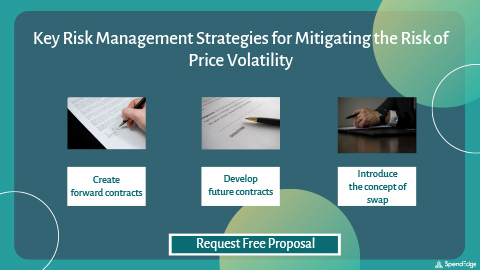LONDON--(BUSINESS WIRE)--SpendEdge, a leading provider of procurement market intelligence solutions, has announced the completion of their latest article on the risk management strategies to address price volatility in the US oil and gas industry.
The complex nature of the oil and gas industry makes it arguably the industry with the highest risk factor. Companies have to consistently deal with fluctuating oil prices. Not only this, political risks, security risks, lifting, and complex production processes create uncertainties at different levels. Developing risk management strategies becomes imperative in such a situation for companies to ensure financial sustainability and protect investors within the sector.
At SpendEdge, we believe that investors can still make substantial profits by improving the risk management process. Therefore, we have identified key strategies that can be adopted by firms in the US oil and gas industry to mitigate the risk of price volatility.
Key Risk Management Strategies for Mitigating the Risk of Price Volatility
Create forward contracts
Forward contracts are customized contracts that specify prices for both parties to purchase or sell an asset on a future date. They are primarily used for hedging or speculation. According to the laws in the US, such contracts are private agreements signed between the two parties that compel both of them to sell or buy oil at a set price equal to the forward prices set at the start of the contract.
Creating contracts that can meet future requirements is crucial for companies to avoid revenue losses. Request free platform access to leverage contract management services and get the possible terms during every purchase.
Develop future contracts
Future contracts are traded in exchanges, where buyers and sellers are represented by a clearing house. This helps firms to mitigate the risk of default and ensure the quality and quantity of products delivered. Such contracts are given higher priority in the US oil and gas industry as they take the risk away from the parties. For comprehensive insights, get in touch with our analysts here!
Introduce the concept of swap
Swaps are considered as a hedging instrument for risk mitigation that can be easily applied in the oil and gas industry. It involves the exchange of financial assets between concerned parties at a predetermined rate as per the contractual terms. Swaps transfer the risk of price volatility from oil producers and ensure a firm price for a calculated volume of crude oil for companies.
To gain comprehensive insights into the risk management strategies, read the complete article now!
You may also like:
- Global Fuel Oil Utilities Industry - Procurement Market Intelligence Report
- Risk Management Strategy in Procurement and Supply Chain
- Supply Chain Analysis Helps an Oil and Gas Industry Client Streamline the Procure to Pay Process
About SpendEdge:
SpendEdge shares your passion for driving sourcing and procurement excellence. We are the preferred procurement market intelligence partner for 120+ Fortune 500 firms and other leading companies across numerous industries. Our strength lies in delivering robust, real-time procurement market intelligence reports and solutions.
Request free proposal to know more, https://www.spendedge.com/request-free-proposal




